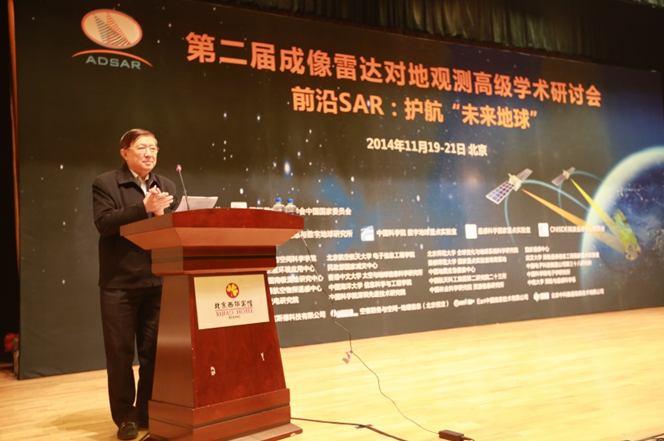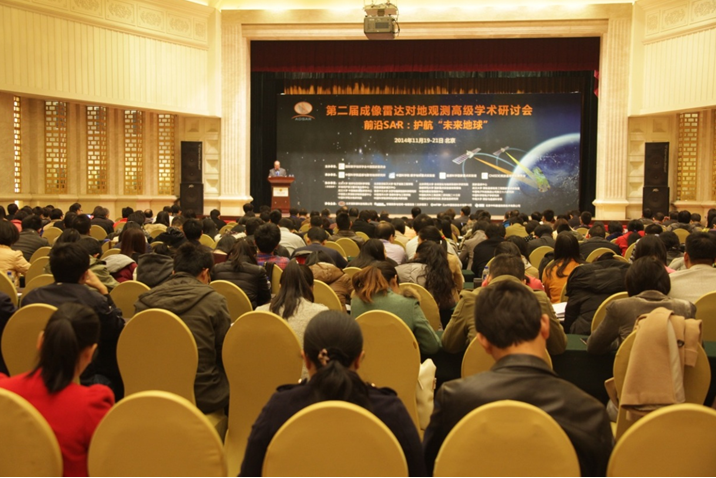On November 19, the Second Conference on Advanced Synthetic Aperture Radar (SAR) for Earth Observation (ADSAR 2014 for short) was unveiled in Beijing. Over 300 SAR experts, graduate students and enterprise representatives from some 60 organizations attended the event.
The theme of the event is: SAR Technology Supporting the “Future Earth”. As Chairman of the event, CAS Academician Prof. GUO Huadong from RADI delivered a welcome speech. He introduced “Future Earth”, a 10-year international research initiative that will develop the knowledge for responding effectively to the risks and opportunities of global environmental change and for supporting transformation towards global sustainability in the coming decades, and the challenges it faces, and pointed out the important role that SAR Earth observation will play in “Future Earth” development.
CAS Academician Prof. XU Guanhua said that after over 50 years of development, SAR remote sensing, with new technologies, notions and concepts, has seen wider application and contributed to people’s understanding of the nature. He introduced new radar plans of different countries and called on scientists in relevant fields to embrace a global perspective, address the challenges for “Future Earth” with SAR Earth observation technologies, and do their bit for the sustainable development of “Future Earth”.
CAS Academician Prof. TONG Qingxi talked about the wide application of SAR technologies and pointed out the crucial role they play in comprehensive Earth information acquisition and analysis. Also, as he pointed out, global changes and other problems that mankind faces today have made it urgent for SAR technologies to play their role, and it is hoped that we promote development in this regard jointly to create a better future for the Earth.
LI Jiahong, Deputy Director of National Remote Sensing Center of China (NRSCC) said that SAR technologies are the most innovative, challenging, and promising among Earth observation technologies, and new progress has been made in this field in China. He made three propositions at the event. First, we should be clearly aware of the problems we face now and take actions accordingly. Second, we should endeavour to improve international cooperation. Third, we need to pay more attention to global ground observation so as to promote development in this regard.
Prof. GUO Huadong and Prof. CHEN Kunshan were invited to give speeches respectively titled “Radar Earth Observation in a Broad Perspective” and “Prospect of SAR Remote Sensing”. In his speech, Prof. Guo reviewed SAR development since the birth of the first SAR in 1960, explained the scientific goals of “Future Earth”, elaborated from four aspects on his proposal that Future Earth can be advanced by exploring new resources and developing new technologies. Prof. Chen talked about the development history, application and future prospect of SAR, and discussed SAR application in target identification, terrain mapping, and ground deformation monitoring as well as relevant technical issues.
During the three-day event, participants exchanged opinions on the theories and models of radar Earth observation, SAR systems, radar imaging and processing technologies, and the application of radar Earth observation. Discussions involved the application of airborne and satellite SAR systems, SAR system simulation, scattering features of ground targets, SAR imaging algorithm, polarization and compact polarization, and bi-static & multi-static SAR in global changes, land resources, natural disasters, environment, agriculture, forestry, geology, mining, urban management, and remote-sensing archaeology.
ADSAR 2014 is hosted by the Chinese National Committee for the International Society for Digital Earth (CNISDE), organized jointly by the Institute of Remote Sensing and Digital Earth (RADI), the CAS Key Laboratory of Digital Earth Science, the State Key Laboratory of Remote Sensing Science, and CNISDE Special Committee of Microwave Remote Sensing, and co-sponsored by 20 organizations including Beihang University, NRSCC, Wuhan University, the Chinese University of Hong Kong, Central South University, and Beijing Normal University.

Prof. Guo Huadong delivering his speech.

Prof. Xu Guanhua addressing the conference.

Prof. Tong Qingxi addressing the conference.

Prof. Chen Kunshan delivering his speech.

A scene from the conference.